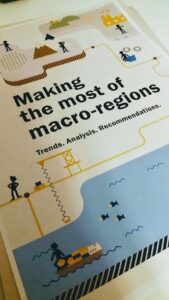NEW INTERACT STUDY: “MAKING THE MOST OF MACRO-REGIONAL STRATEGIES”
Interact has become a well-established organisation that plays an important role in Interreg, in cooperation between EU Member States and EU regions, and along the external borders of the EU. There are more than 100 Interreg programmes managing thousands of cooperation projects throughout Europe who are dealing with these issues.The Interact programme’s specific mission is to support these programmes in their daily work. So to help them successfully navigate the Interreg world, they provide advice, organise learning events and develop a wide range of tools. Interact also harmonises processes to help programmes work more efficiently and to make the life of project applicants easier. They act as a hub to allow programmes to exchange experiences and network, among others, they explore and encourage innovative ways of cooperating in Europe by supporting macro-regional and sea basin strategies as well as legal structures and initiatives to facilitate cooperation activities.
programmes managing thousands of cooperation projects throughout Europe who are dealing with these issues.The Interact programme’s specific mission is to support these programmes in their daily work. So to help them successfully navigate the Interreg world, they provide advice, organise learning events and develop a wide range of tools. Interact also harmonises processes to help programmes work more efficiently and to make the life of project applicants easier. They act as a hub to allow programmes to exchange experiences and network, among others, they explore and encourage innovative ways of cooperating in Europe by supporting macro-regional and sea basin strategies as well as legal structures and initiatives to facilitate cooperation activities.
The booklet intends to take stock of this development and its multifaceted aspects. Interact has the task to establish a learning process among the four strategies. This booklet has been planned, designed and conceived in the spirit of promoting and spreading the macro-regional idea.
establish a learning process among the four strategies. This booklet has been planned, designed and conceived in the spirit of promoting and spreading the macro-regional idea.
A wide range of topics is covered in this publication, such as the involvement of regional parliaments in macro-regional strategies, general aspects ofgovernance, policy integration, cross-sectoral cooperation, as well as monitoring and evaluation of macro-regional strategies. In addition to these horizontal aspects, a specific project example in the Baltic Sea Region illustrates how to overcome challenges in governance and stakeholder engagement.
Furthermore, the concept of a macro-regional strategy is also proposed for the North Sea region in order to enhance regional cooperation and thereby share ideas and experiences more effectively. Moreover, the booklet deals with issues such as participation and effects of inter-organisational networks in the framework of the EU Strategy for the Alpine Region, capacity building at both the individual and institutional level, as well as the involvement of non-EU Member States.



